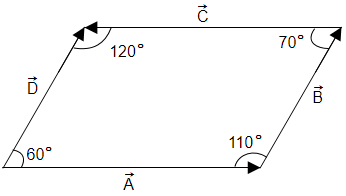A certain vector in the xy-plane has an x-component of \(4\) m and a y-component of \(10\) m. It is then rotated in the xy-plane so that its x-component is doubled. Then, its new y-component will be: (approximately)
1. \(20\) m
2. \(7.2\) m
3. \(5.0\) m
4. \(4.5\) m
1. \(20\) m
2. \(7.2\) m
3. \(5.0\) m
4. \(4.5\) m
The acceleration of a particle is given by \(a=3t\) at \(t=0\), \(v=0\), \(x=0\). The velocity and displacement at \(t = 2~\text{sec}\) will be:
\(\left(\text{Here,} ~a=\frac{dv}{dt}~ \text{and}~v=\frac{dx}{dt}\right)\)
1. \(6~\text{m/s}, 4~\text{m}\)
2. \(4~\text{m/s}, 6~\text{m}\)
3. \(3~\text{m/s}, 2~\text{m}\)
4. \(2~\text{m/s}, 3~\text{m}\)
At what angle must the two forces \((x+y)\) and \((x-y)\) act so that the resultant comes out to be
1. \(\cos^{-1}\left(-\frac{x^2+y^2}{2(x^2-y^2)}\right )\)
2. \(\cos^{-1}\left(-\frac{2(x^2-y^2)}{(x^2+y^2)}\right )\)
3. \(\cos^{-1}\left(-\frac{x^2+y^2}{x^2-y^2}\right )\)
4. \(\cos^{-1}\left(-\frac{x^2-y^2}{x^2+y^2}\right )\)
\(\overrightarrow{A}\) and \(\overrightarrow B\) are two vectors and \(\theta\) is the angle between them. If \(\left|\overrightarrow A\times \overrightarrow B\right|= \sqrt{3}\left(\overrightarrow A\cdot \overrightarrow B\right),\) then the value of \(\theta\) will be:
| 1. | \(60^{\circ}\) | 2. | \(45^{\circ}\) |
| 3. | \(30^{\circ}\) | 4. | \(90^{\circ}\) |
If \(\overrightarrow{a}\) is a vector and \(x\) is a non-zero scalar, then which of the following is correct?
| 1. | \(x\overrightarrow{a}\) is a vector in the direction of \(\overrightarrow{a}\). |
| 2. | \(x\overrightarrow{a}\) is a vector collinear to \(\overrightarrow{a}\). |
| 3. | \(x\overrightarrow{a}\) and \(\overrightarrow{a}\) have independent directions. |
| 4. | \(x\overrightarrow{a}\) is a vector perpendicular to \(\overrightarrow{a}\). |
A body is moving according to the equation \(x = at +bt^2-ct^3\) where \(x\) represents displacement and \(a, b~\text{and}~c\) are constants. The acceleration of the body is: (\(\text{Given:}~ a=\frac{d^2x}{dt^2}\))
1. \(a+ 2bt\)
2. \(2b+ 6ct\)
3. \(2b- 6ct\)
4. \(3b- 6ct^2\)
The linear velocity of a rotating body is given by , where is the angular velocity and r is the radius vector. The angular velocity of a body, and their radius vector is will be:
1.
2.
3.
4.
A child pulls a box with a force of \(200~\text{N}\) at an angle of \(60^{\circ}\)
1. \(100~\text{N}, ~175~\text{N}\)
2. \(86.6~\text{N}, ~100~\text{N}\)
3. \(100~\text{N}, ~86.6~\text{N}\)
4. \(100~\text{N}, ~0~\text{N}\)
In the given figure

| 1. | Angle between \(\overrightarrow {A}\) and \(\overrightarrow {B}\) is \(110^{\circ}\) |
| 2. | Angle between \(\overrightarrow {C}\) and \(\overrightarrow {D}\) is \(60^{\circ}\) |
| 3. | Angle between \(\overrightarrow {B}\) and \(\overrightarrow {C}\) is \(110^{\circ}\) |
| 4. | Angle between \(\overrightarrow {B}\) and \(\overrightarrow {C}\) is \(70^{\circ}\) |
If vector \(\overrightarrow{A} = \cos \omega t \hat{i} + \sin \omega t \hat{j}\) and \(\overrightarrow{B} =\cos \frac{\omega t}{2} \hat{i} + \sin \frac{\omega t}{2} \hat{j}\) are functions of time, then the value of \(t\) at which they are orthogonal to each other will be:
1. \(t = \frac{\pi}{2\omega}\)
2. \(t = \frac{\pi}{\omega}\)
3. \(t=0\)
4. \(t = \frac{\pi}{4\omega}\)



